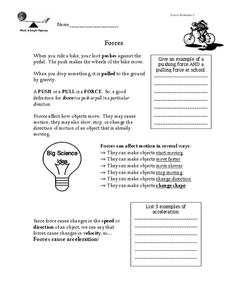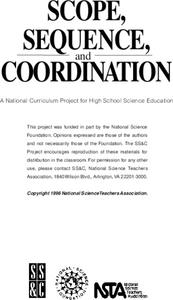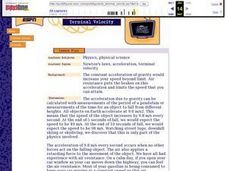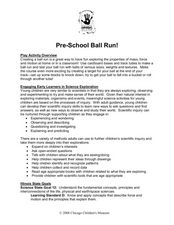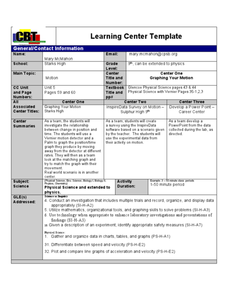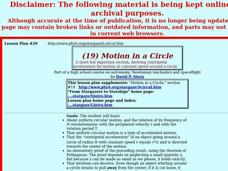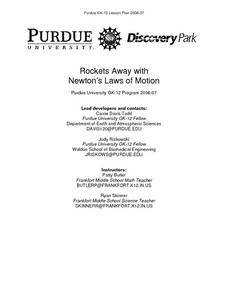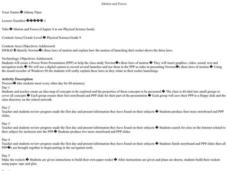Curated OER
Forces
In this forces worksheet, students read about force and acceleration. They complete a Venn Diagram to compare and contrast balanced and unbalanced forces, they answer questions about a diagram of a tug-a-war and the forces acting on each...
Curated OER
Introduction to Physical Science
Students discuss Newton's laws of motion. In this motion activity, students watch a video that explains Newton's laws. They play a marble game and watch for laws of motion and force.
Curated OER
Force & Acceleration
Young scholars investigate the effects of weights on the motion of a toy car. In this force and acceleration lesson plan, students use different weights, a toy car, a paper clip and string to determine how a car will move as different...
Curated OER
Forces and Newton's Three Laws
Students watch demonstrations of forces and Newton's Three Laws. For this forces lesson, students watch four demonstrations and complete the associated worksheets associated with Newton's Laws. There is a PowerPoint that can be accessed...
Curated OER
Move It!!!
Students explore motion by observing the movement of people and duplicating those movements. They compare and contrast various kinds of movements and identify different types of movements in pictures. They build an object that can be...
Virginia Department of Education
Work and Power
Assist your class with correctly calculating the values for force, work, and power as they determine the amount various activities require. They gather data and participate in a group discussion to compare results upon conclusion of the...
Curated OER
Lesson 3: Acceleration and Force
A nine-page physics resource supports your lesson on acceleration. A step-by-step lesson plan walks you through the materials you need, the background information, steps for leading experimentation, and the explanation of the results....
Kenan Fellows
The Newton Challenge
Make Newton proud. Scholars apply their understanding of forces and energy to an engineering design challenge. They learn about simple machines, create a presentation on Newton's laws, and develop a balloon-powered car.
Curated OER
Work and Energy
The first activity may not work for your class if you don't have access to an open area of 30 meters and two cars of different masses, but the remaining activities can be used in any physics course. They all involve the investigation of...
Curated OER
Terminal Velocity
Students calculate acceleration due to gravity with the measurements of the period of a pendulum or measurements of the time for an object to fall from different heights. They observe and measure the effect of air resistance on the...
Curated OER
Newton's Second Law
Three memorable activities build on each other to give physics masters a firm grasp of Newton's Second Law. Pupils play with a lab cart on a flat surface and on an incline to confirm that force is equal to mass times acceleration. In the...
Curated OER
Pre-School Ball Run
Students demonstrate force and motion by rolling a ball through a tube. In this motion lesson students explore what happens to the ball when it is rolled with other balls of various sizes, weights, and textures.
Curated OER
"Graphing Your Motion"
Students study the concepts of motion, velocity, and acceleration through graphing their own movement using LoggerPro. They explain the difference between speed and velocity using the weather vane example. They discover the difference...
Curated OER
Inertia
Students conduct a simple inertia demonstration by spinning a hardboiled and raw egg. They push a wagon to demonstrate inertia. They explore Newton's first and second laws of motion.
Curated OER
MOTION IN A CIRCLE
Young scholars explore uniform circular motion, and the relation of its frequency of N revolutions/sec with the peripheral velocity v and with the rotation period T, and the "centripetal acceleration" of an object.
Curated OER
Rockets Away with Newton's Laws of Motion
Eighth graders comprehend Newton's Laws of Motion and to use the scientific method in rocketry sub-unit. They work through the scientific method. Students illustrate how science and Newton's Laws can be used in everyday situations and...
Curated OER
Motion and Forces
Ninth graders create PowerPoint presentations to present Newton's three laws of motion, and make and launch rockets.
Institute of Electrical and Electronics Engineers
Fun with Speedboats!
After reading about marine engineers and naval architects, it's all hands on deck to design and test a speed boat. This lesson is designed for the Next Generation Science Standards in engineering and can be a centerpiece for a STEM...
Institute of Electrical and Electronics Engineers
Trebuchet Toss
Young engineers work in teams to design and build their own trebuchets according to certain criteria; they must be able to launch a mini marshmallow accurately into a pie tin. Background reading material, a planning sheet for trebuchet...
Curated OER
Forces on an Airplane and Resulting Motion
Students read from a NASA Web-based textbook, then students demonstrate an understanding of the text by answering questions about the forces on an airplane and their resulting motions.
Curated OER
Projectile Motion
Learners observe projectile motion and calculate the speed of a baseball based on the time and distance traveled. They record the time, measure the distance, and draw the path of the ball's travel on a data table.
Curated OER
May the Force Be With You
Students work in groups, they investigate how different forces act upon objects and how this information can be used in their day-to-day lives. They wrap the rubber band around the book. Students place the bo.ok and ruler on top of a...
Curated OER
Rocket Science 101
Students explore the aspects of Newton's First and Third Laws of Motion as they conduct controlled rocketry experiments and analyze the Mars Mission in terms of the principles of rocketry.
Curated OER
Physics: Bounce - Projectile Motion and Collisions
Students conduct and observe experiments in Newtonian mechanics, kinematics, and projectile motion. They analyze the motion of a ball rolling off a table, falling, and then bouncing. Students answer a series of questions analyzing the...
